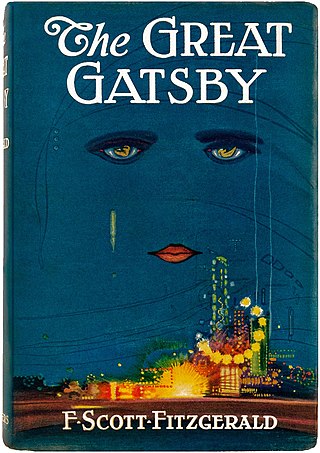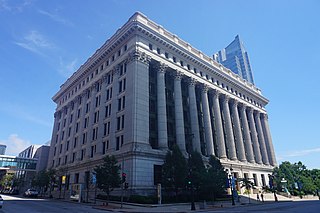
The Great Gatsby is a 1925 novel by American writer F. Scott Fitzgerald. Set in the Jazz Age on Long Island, near New York City, the novel depicts first-person narrator Nick Carraway's interactions with mysterious millionaire Jay Gatsby and Gatsby's obsession to reunite with his former lover, Daisy Buchanan.

Gordon Meredith Lightfoot Jr. was a Canadian singer-songwriter and guitarist who achieved international success in folk, folk-rock, and country music. He is credited with helping to define the folk-pop sound of the 1960s and 1970s. He has been referred to as Canada's greatest songwriter and his songs have been recorded by some of the world's most renowned musical artists. Lightfoot's biographer Nicholas Jennings said, "His name is synonymous with timeless songs about trains and shipwrecks, rivers and highways, lovers and loneliness."

SS Edmund Fitzgerald was an American Great Lakes freighter that sank in Lake Superior during a storm on November 10, 1975, with the loss of the entire crew of 29 men. When launched on June 7, 1958, she was the largest ship on North America's Great Lakes, and she remains the largest to have sunk there. She was located in deep water on November 14, 1975, by a U.S. Navy aircraft detecting magnetic anomalies, and found soon afterwards to be in two large pieces.

Zelda Fitzgerald was an American novelist, painter, playwright, and socialite. Born in Montgomery, Alabama, to a wealthy Southern family, she became locally famous for her beauty and high spirits. In 1920, she married writer F. Scott Fitzgerald after the popular success of his debut novel, This Side of Paradise. The novel catapulted the young couple into the public eye, and she became known in the national press as the first American flapper. Due to their wild antics and incessant partying, she and her husband became regarded in the newspapers as the enfants terribles of the Jazz Age. Alleged infidelity and bitter recriminations soon undermined their marriage. After traveling abroad to Europe, Zelda's mental health deteriorated, and she had suicidal and homicidal tendencies which required psychiatric care. Her doctors diagnosed Zelda with schizophrenia, although later posthumous diagnoses posit bipolar disorder.

Edmund Wilson Jr. was an American writer, literary critic and journalist. He is widely regarded as one of the most important literary critics of the 20th century. Wilson began his career as a journalist, writing for publications such as Vanity Fair and The New Yorker. He helped to edit The New Republic, served as chief book critic for The New Yorker, and was a frequent contributor to The New York Review of Books. Wilson was the author of more than twenty books, including Axel's Castle, Patriotic Gore, and a work of fiction, Memoirs of Hecate County. He was a friend of many notable figures of the time, including F. Scott Fitzgerald, Ernest Hemingway, and John Dos Passos. His scheme for a Library of America series of national classic works came to fruition through the efforts of Jason Epstein after Wilson's death. He was a two-time winner of the National Book Award and received the Presidential Medal of Freedom in 1964.

"The Wreck of the Edmund Fitzgerald" is a 1976 hit song written, composed and performed by the Canadian singer-songwriter Gordon Lightfoot to commemorate the sinking of the bulk carrier SS Edmund Fitzgerald on Lake Superior on November 10, 1975. Lightfoot drew his inspiration from Newsweek's article on the event, "The Cruelest Month", which it published in its November 24, 1975, issue. Lightfoot considered this song to be his finest work.
Edward Fitzgerald or FitzGerald may refer to:

Penelope Mary Fitzgerald was a Booker Prize-winning novelist, poet, essayist and biographer from Lincoln, England. In 2008 The Times listed her among "the 50 greatest British writers since 1945". The Observer in 2012 placed her final novel, The Blue Flower, among "the ten best historical novels". A.S. Byatt called her, "Jane Austen’s nearest heir for precision and invention."

This Side of Paradise is the debut novel by American writer F. Scott Fitzgerald, published in 1920. It examines the lives and morality of carefree American youth at the dawn of the Jazz Age. Its protagonist, Amory Blaine, is an attractive middle-class student at Princeton University who dabbles in literature and engages in a series of romances with flappers. The novel explores the theme of love warped by greed and status-seeking, and takes its title from a line of Rupert Brooke's poem Tiare Tahiti.

The Beautiful and Damned is a 1922 novel by American writer F. Scott Fitzgerald. Set in New York City, the novel's plot follows a young artist Anthony Patch and his flapper wife Gloria Gilbert who become "wrecked on the shoals of dissipation" while excessively partying at the dawn of the hedonistic Jazz Age. As Fitzgerald's second novel, the work focuses upon the swinish behavior and glittering excesses of the American social elite in the heyday of New York's café society.
James FitzGerald or James Fitzgerald may refer to:

Mariners' Church of Detroit is a church with worship services adhering to Anglican liturgical traditions located at 170 East Jefferson Avenue in Downtown Detroit, Michigan. It was founded in 1842 as a special mission to the maritime travelers of the Great Lakes and functioned as a parish of the Episcopal Diocese of Michigan until 1992, when the Michigan Court of Appeals ruled it was incorporated as an independent congregation. The church was listed on the National Register of Historic Places in 1971. The church has a non-exclusive, limited association with the REC Diocese of Mid-America which itself is a founding member of the Anglican Church in North America.

Summertime Dream is Canadian singer Gordon Lightfoot's eleventh studio album, released on the Reprise Records label in 1976. It peaked at #1 on the Canadian RPM national album chart, and #12 on the US Billboard pop chart.

Jay Gatsby is the titular fictional character of F. Scott Fitzgerald's 1925 novel The Great Gatsby. The character is an enigmatic nouveau riche millionaire who lives in a luxurious mansion on Long Island where he often hosts extravagant parties and who allegedly gained his vast fortune by illicit bootlegging during prohibition in the United States. Fitzgerald based many details about the fictional character on Max Gerlach, a mysterious neighbor and World War I veteran whom the author met while living in New York City during the raucous Jazz Age. Like Gatsby, Gerlach threw lavish parties, never wore the same shirt twice, used the phrase "old sport", claimed to be educated at Oxford University, and fostered myths about himself, including that he was a relation of the German Kaiser.

Francis Scott Key Fitzgerald was an American novelist, essayist, and short story writer. He is best known for his novels depicting the flamboyance and excess of the Jazz Age—a term he popularized in his short story collection Tales of the Jazz Age. During his lifetime, he published four novels, four story collections, and 164 short stories. Although he achieved temporary popular success and fortune in the 1920s, Fitzgerald received critical acclaim only after his death and is now widely regarded as one of the greatest American writers of the 20th century.
The FitzGerald dynasty is a Hiberno-Norman or Cambro-Norman noble family.
Edmund is an English masculine given name.
Joseph Beverly MacInnis D.Sc. is a Canadian physician, author, and diver. In 1974, MacInnis was the first scientist to dive in the near-freezing waters beneath the North Pole. In 1976 he became a member of the Order of Canada.

Northwestern Mutual is an American financial services mutual organization based in Milwaukee, Wisconsin. The financial security company provides consultation on wealth and asset income protection, education planning, retirement planning, investment advisory services, financial planning trust and private client services, estate planning and business planning. Its products include life insurance, permanent life insurance, disability income, and long-term care insurance; annuities; investments; and investment advisory products and services. Northwestern Mutual ranked No. 90 on the 2021 Fortune 500 list of the largest United States corporations by total revenue and is in the top 30 by assets held. The firm distributes a portion of its earnings to eligible policyholders as annual dividends.

FitzGerald or Fitzgerald, is an Irish surname of Hiberno-Norman origin. It is a patronymic derived from the prefix Fitz- from the Latin filius- plus Gerald, thus meaning "son of Gerald”. In Gaelic it is rendered Mac Gearailt.














